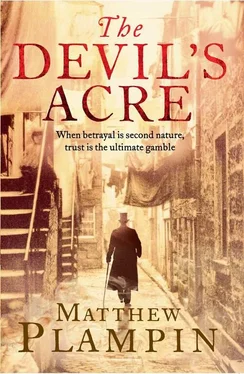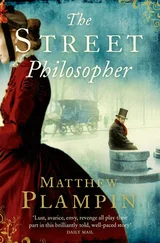Martin and Caroline had never been particularly friendly. He knew that she didn’t much like her sister being married to an Irishman, and living off in the Devil’s Acre. Amy and her had been close when they were small, there only being a year between them. The two girls looked alike, it had to be said, sharing the same broad cheekbones and pretty, slightly crooked mouth. Amy’s hair was darker, though, and her eyes larger, and her thoughtful manner was replaced in Caroline by an argumentative, trouble-making curiosity that Martin found difficult to warm to. He asked her what she was doing in the Eagle, keeping his tone pleasant, knowing as he spoke what her answer would be.
‘Why, Mart, I am an employee of Colonel Colt,’ she replied, flashing Mr Quill a bright, saucy smile. ‘I daresay I’ve been under his roof for almost as long as you have, though of course I ain’t yet reached the same level of favour. I’m in here now with some of my new pals from the machine floor, enlarging our acquaintance, as they say.’
Somewhat reluctantly, Martin introduced her to Mr Quill, explaining their connection. He beamed back at her, utterly charmed. She already knew exactly who the chief engineer was, and had a series of questions lined up about her employer which it pleased him enormously to answer. After a minute, he turned to the bar to buy them all new drinks.
‘Will you have some dog’s-nose, Caroline?’
‘Just gin for me, sir, if you please,’ she said with a mock-curtsey. ‘You may leave out the ale.’
Martin felt a pang of irritation. ‘How did you know of the factory, then?’ he asked. ‘How did you know that the Colonel was hiring?’
She moved in a little closer, angling her hip towards Mr Quill as she took her glass of gin from his hand; the two moles on her cheek, distinct marks a neat inch apart, stood out like an adder-bite against the liquor-flushed skin. ‘My sister told me that you were thinking of joining, Martin.’ She hesitated. ‘Along with some of your friends, them coves what was in here earlier, Pat Slattery and the rest. I’d just lost my position – through no fault of my own, Mr Quill, I assure you – so I thought I’d try gun-making for myself. I find that I rather like it.’
‘It’s fine work indeed for a strong, smart girl,’ said Mr Quill approvingly, ‘until a good husband comes along, at least.’ He removed his worn sailor’s cap, exposing his unruly thatch of hair. ‘Don’t suppose you’d consider the chief engineer, Caroline, scoundrelly old wretch tho’ he be?’
Martin made a show of joining in their free, boozy laughter, just managing to hide his annoyance at the thought of this infernally nosy girl having placed herself within the gun factory. Molly’s work could still be done, of course, but his sister-in-law’s presence was something else he’d now have to take into consideration.
Caroline knew not to outstay her welcome. After exchanging a couple more playful remarks with Mr Quill, she polished off her gin, bade them a good night and went back to the snug. The engineer watched her go before drinking down his dog’s-nose and ordering them both another.
‘So,’ he said when the drinks had arrived, ‘you’re married to an Englishwoman.’
Martin’s self-control left him. He would not be rebuked or teased for this now, and certainly not by Ben Quill – a Yankee, for Christ’s sake. ‘Mother o’ God,’ he snapped, ‘can a man control the workings of his heart? He cannot, Mr Quill – he cannot.’ Surprised by this outburst, by the honesty in his voice, he quickly lifted up his pot again, hiding himself behind it as he took a long swallow.
There was a pause; then Mr Quill, with a sad shake of his head, knocked his pot solemnly against Martin’s. ‘By Heavens, Mart,’ he murmured, ‘I’ll surely drink to that.’
The Eagle closed its doors at twelve. Martin and Mr Quill, both well-oiled, started wandering up the Belgrave Road, through the eerie silence of Pimlico’s southern end. It was a warm night, a taste of the approaching summer; the two men puffed on their pipes, ambling along with no particular purpose in mind. Caroline had departed the tavern some time before. Thankfully, Mr Quill’s interest in her had shown itself to have been light-hearted and of the moment only. After she’d left them, in fact, the engineer had seemed to forget her existence altogether. He was now engaged in some slurred philosophising, rambling on about the role of the machine in what he termed ‘manifest destiny’. Martin wasn’t really listening.
After a while, they left the main avenue, lurching onto a side-street. Identical apartment-houses, four storeys tall, built with red brick and fringed with stucco, loomed on either side of them in two long lines. Only recently completed by Cubitt’s men and still unoccupied, the windows of these houses were as dark and smooth as tar pools. The sounds of London – the yelping of dogs, the rumble of coach-wheels over on the Vauxhall Bridge Road – were but faint ghosts of themselves, banished to the distant background. The street was as clean as it was quiet. Not a trace of mud or dung could be seen on the cobblestones, their fish-scale pattern catching the dull moonlight; and even the stench of the river was masked by the mineral smell of fresh cement and stone.
They reached the end of a row. The next block along was still under construction, swathed in scaffolding, the shadowy road before it piled with whatever materials Cubitt’s foremen had judged too heavy for thieves to make off with. Through the many gaps in the unfinished buildings, across an expanse of barren land, Martin saw a night-site at work, a tower of light and action in the surrounding darkness. Labourers scaled the ladders of the scaffold, heavy hods of stone balanced on their shoulders; bricklayers slowly built up walls, inserting each new piece with steady concentration. The jokes and curses of both echoed along the empty streets. Martin stopped to take it in, smoking reflectively, leaning against a covered mortar-barrel.
A footstep crunched nearby, from inside one of the incomplete apartment buildings further along the row – a man’s footstep, heavy and sure, stepping on a bed of gravel. Martin felt a distinct, sobering nip of wrongness. He knocked out his pipe. Quill was further down the street, pointing into the air and gassing on like a true taproom orator. Martin whispered his name, gesturing for silence.
‘What’s up?’ the engineer called back, as loudly as ever, stretching out his arms. ‘What’s the problem, Mart?’
There were more footsteps, and some muttering; Martin went over to Quill’s side. ‘Someone’s here with us, Mr Quill.’
Quill drew on his pipe, making the tobacco in the bowl crackle and glow. ‘Footpads?’ he asked, speaking excitedly through the side of his mouth, as if eager to fend off such an attack. ‘How many?’
‘I don’t believe so,’ Martin replied, glancing over his shoulder. ‘Why would such people be out here? There’s none about but us. Pretty slim pickings. No, this is different.’ He met Quill’s eye: this was worse.
The engineer wasn’t alarmed. ‘What should we do, then?’
Martin nodded towards the night-site, its lamps twinkling between the scaffold poles and slabs of masonry. It suddenly seemed very far away. ‘Best bet’s to head over there, I reckon. Straight through these buildings here – towards the light.’
Before they could act, however, the trap was sprung. Three men appeared from behind a stack of planks, dressed in working clothes. All three were solidly built and had short, stout sticks in their hands. Martin turned; four more were approaching fast from the opposite direction. They’ve been stalking us, he thought, from the moment we left the Eagle, waiting for the right moment to strike. He cursed himself for all the pots he’d sunk – for stumbling so unsuspectingly into this crude snare. How could he have been so bloody stupid?
Читать дальше












